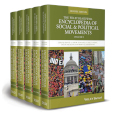Asian American Feminism
Abstract
Like other racially identified feminist formations, Asian American feminisms emerged as women of color challenged the racism they experienced in the white-dominant women's movement. The pattern of exclusion and invisibility experienced by Asian American women in local and national feminist organizations is well documented in texts such as This Bridge Called My Back: Writings by Radical Women of Color, first published in 1981. Mitsuye Yamada's now famous piece “Invisibility is an unnatural disaster” named the problem of invisibility, silence, and the erasure of Asian American women as impacted by patriarchy, racism, and classism, as well as agents of change as activists and community organizers. In Yamada's second piece in This Bridge, “Asian Pacific American women and feminism,” she confronts the marginalization and tokenization Asian American feminists experienced in white women's organizations, women's studies programs, and political events. In response to these systematic experiences, Yamada notes that by the 1970s Asian American women formed writing collectives resulting in the publications of Asian American feminist writing, and the mass organization of Asian American women's conferences in places like New York, Hawai‘i, and San Francisco.



